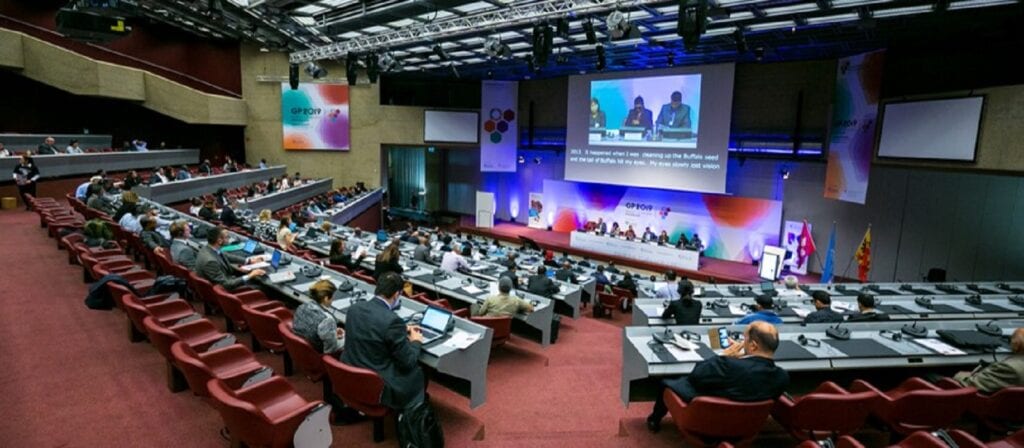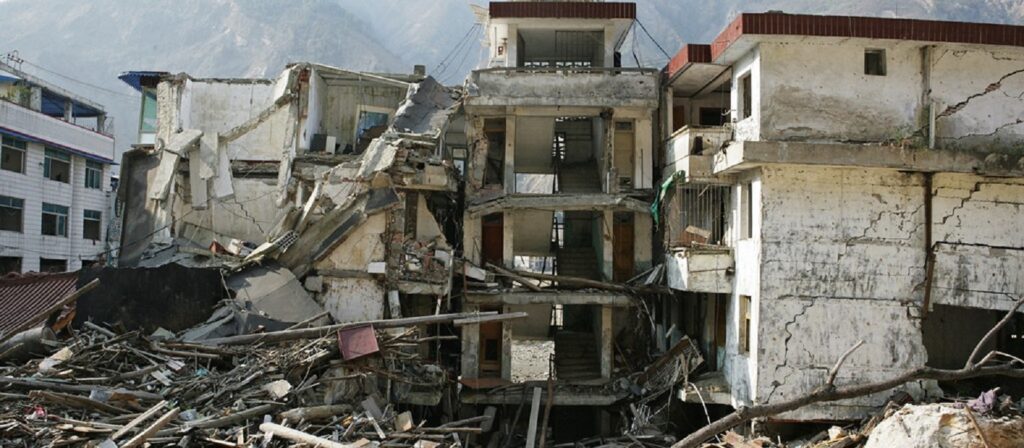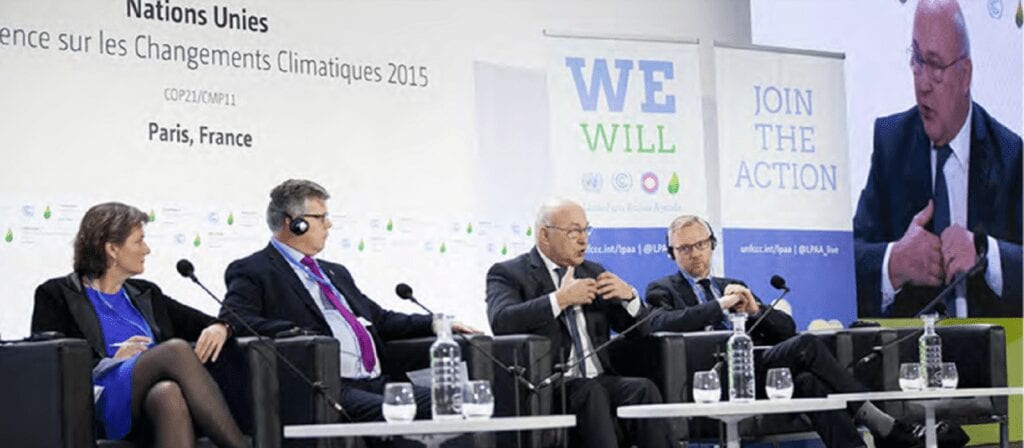Manchester, UK, Thursday 25 May 2017: Shaun Tarbuck, Chief Executive of the International Cooperative and Mutual Insurance Federation (ICMIF) yesterday addressed the Risk Transfer and Insurance for Resilience Working Session at the Global Platform for Disaster Risk Reduction (Global Platform) in Cancun, Mexico. Both the Sendai Agreement and the 2030 Agenda, he said, demanded greater collaboration among stakeholders and provided the insurance sector with a new impetus to help balance the practice of post-disaster financing with increased focus on disaster risk reduction.
The Global Platform has been organised by the United Nations Office for Disaster Risk Reduction (UNISDR) and runs from 22 to 26 May.
In his speech, Tarbuck told the assembled delegates that the insurance industry has over 300 years of experience in understanding risk and providing financial protection of people and property from disasters. But, he said, it also played a crucial role in promoting resilience around the world. Sustainable insurance systems did not just pay claims: they evaluated risk, defined and enforced standards of resilience such as building codes, and enabled communities to spread the residual risk.
Tarbuck looked back on the history of insurance and how it has helped communities manage their many and varied risks for centuries. In the pre-industrial revolution 18th and 19th centuries, extreme poverty gave way to the creation of collective insurance. “Communities came together to pool their risks and create social safety nets of their own,” Tarbuck said. “These pools gradually grew into larger cooperatives and mutuals, empowering communities to work collectively in the face of extreme adversity. This is the same story being lived out today. Effective and resilient insurance systems put individuals at the centre of decision-making”.
Tarbuck continued by saying that understanding and engaging with communities that face particular risk, delivering on specific needs to increase resilience, and reducing disaster risks to co-create services would enable the paradigm shift needed to move beyond merely providing insurance products to creating a platform for risk reduction and sustainable insurance protection.
Tarbuck told the conference that Insurance is an essential component of an overall resilience strategy which includes the use of effective mechanisms to reduce risk. Working with communities to build literacy about their risk exposure, with the shared objective of reducing risk, builds trust and creates a robust platform to deliver at scale. This scale is essential if we are to close the protection gap and address the underlying drivers of risk.”
The development of microinsurance over the past 15 years has proved an essential tool for poverty alleviation, explained Tarbuck, with an estimated 500 million+ people now having some form of microinsurance coverage. He went on to say that some evidence, however, suggests that the industry has moved too fast, has been too anxious to achieve scale, and has not focused sufficiently on making a real impact on people’s livelihoods. With a potential market of over 2 billion people still needing access to microinsurance, Tarbuck said, we find ourselves at an important juncture today.
Building resilient insurance systems takes a long time, but ultimately this is far more sustainable, Tarbuck claimed, citing the example of mutual and cooperative insurers which have, an average age of 95 years. If we build it right, Tarbuck said, these systems will grow and assist significantly in the sustainable development of countries.
The ICMIF 5-5-5 Mutual Insurance Strategy
Tarbuck told the conference about how the ICMIF 5-5-5 Mutual Insurance Strategy was launched in December 2015 at the COP21 summit in Paris with the aim of providing resilience insurance to 5 million policyholders in five countries over five years. “The 5 million policyholders represent 25 million individuals,” he told delegates, “which means that this one initiative will respond to 25% of the G7 target of insuring 100 million previously uninsured individuals by 2020,” he concluded. The first six months of the Strategy’s operation have seen 1.3 million previously uninsured individuals become insured.
The G7 target has also been adopted by the Insurance Development Forum (IDF), said Tarbuck, with ICMIF being one of the founding members. The IDF is a unique public private partnership whose mission is stated as: “Understanding risk to create resilient platforms for sustainable growth & human dignity” by applying insurers’ risk expertise to the insurance-related challenges and opportunities presented by the 2030 Agenda. Given the scale, scope and complexity of the resilience and protection gap challenge, Tarbuck sees the IDF as providing a coordinated and collaborative approach which, critically, brings together the insurance industry and relevant stakeholders.
Tarbuck concluded by saying that “Real risk mitigation will not happen until we can support those at risk at community level and provide them with the means to protect their lives and livelihoods. This should be through microinsurance as the risk transfer mechanism with all the additional benefits it can deliver. Our belief is that insurance is more than a policy. Insurance and its related capabilities provide mechanisms to build risk literacy by engaging with communities to reduce the risks they face. Insurance is the ultimate community product to support societal resilience.”
Click here to download Shaun Tarbuck’s full speech.
For more information or to arrange interviews, please contact:
Alison Grant, Communications Manager, ICMIF [email protected] +44 161 952 5078
Photo shows: Shaun Tarbuck speaking in the Risk Transfer and Insurance for Resilience Working Session at Global Platform
About ICMIF (see www.icmif.org)
- ICMIF holds nine years’ worth of exclusive data about the mutual sector
- With its global headquarters in the United Kingdom and regional offices in Washington DC, USA; Tokyo, Japan and Brussels, Belgium, today ICMIF represents 290 values-based insurers in 75+ countries with over USD 300 billion in premium income and USD 2 trillion in total assets held. ICMIF delivers unique networking opportunities, market and member intelligence and external relations services. It takes a strong lead in encouraging best practice amongst its member firms in key insurance issues, including; performance management, legal and governance, marketing, brand and reputation, reinsurance and social and environmental performance.
- ICMIF is active in the microinsurance and Takaful sectors
- Follow ICMIF on Twitter at @ICMIF_Web
About the mutual and cooperative insurance sector
- The mutual sector holds 27% of global insurance market share by premium.
- Premium growth of the mutual and cooperative insurance sector since 2007 is 22.1% vs 8.2% in industry
- The sector’s assets of USD 8.1 trillion in 2014 have grown by 33% since 2007
- Employment in the sector accounts for more than 1.1 million jobs
- Over 960 million people are served as member/policyholders by mutual/cooperative insurers


